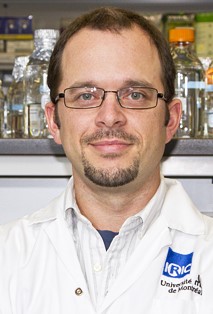
| Titre: | Professeur sous octroi agrégé |
| Adresse: | Institut de recherche en immunologie et cancérologie (IRIC) Université de Montréal C.P. 6128, succursale Centre-ville Montréal (Québec) H3C 3J7 |
| Local: | 3305, Pavillon Marcelle-Coutu |
| Téléphone: | 514-343-6702 |
| Télécopieur: | 514-343-6839 |
| Courriel: | etienne.gagnon@umontreal.ca |
| Site Web: | Ma page personnelle |
Biographie
*version française à venir
Dr. Etienne Gagnon earned his bachelor’s degree in Immunology at the University of Montreal, before undertaking a Ph.D. in Cell Biology in the laboratory of Dr. Michel Desjardins.
During his Ph.D., Dr. Gagnon made significant findings pertaining to our understanding of how exogenous antigens get cross-presented on MHC class-I molecules by macrophages in order to elicit a CD8 T cell response. These findings have redefined the way we look at phagocytosis, membrane trafficking and antigen presentation. Dr. Gagnon then went on to pursue his post-doctoral work within the laboratory of Kai Wucherpfennig at the Dana-Farber Cancer institute, a primary cancer care and research institute affiliated with the Harvard Medical School in Boston, Massachussetts. His work helped establish novel mechanisms pertaining to T cell receptor activation and early signaling which suggests novel avenues for studying immune receptor triggering. Dr. Gagnon was recruited back to Montreal, in 2011, where he joined the Institute for Research in Immunology and Cancer as Principal Investigator and has just now been made Associate Professor at the University of Montreal in the Microbiology and Immunology Department.
One of the main goals of the Gagnon lab are to determine the underpinnings of immune receptor signaling at the molecular level and understand how the tumor microenvironments impacts the critical steps of early as well as late T cell activation. To that end, they use cutting edge imaging techniques to study receptor dynamics as well as ion mobilization in live cells during T cell activation. They also have ongoing collaborations with bio-informatics groups, in order to elucidate the impact of different tumor microenvironments on tumor cell and immune cell transcriptome as well as to design novel in-silico informed synthetic RNA to target vulnerable pathways. The Gagnon lab is also active in the chimeric antigen receptor (CAR-T) immunotherapy field where their expertise in T cell signaling enables them to redesign current receptor architecture, in order to promote more efficient signaling.
Dr. Gagnon was the recipient of several fellowships, grants and awards such as the AAI junior faculty travel awards, the FRQS faculty awards Junior 1 and Junior 2, as well as the Sherring-Plough medal of excellence. Dr. Gagnon currently more than has 20 publications in high impact journals (Cell, Nature, Immunity and J. Exp. Med) with three manuscripts currently under revision and his work has been cited over three thousand times according to Google scholar. His work is currently funded by NSERC, CIHR, and CRS.
Personnel de laboratoire
- Audrey Connolly (Étudiante au doctorat)
- Jordan Quenneville (Étudiant au doctorat)
- Rébecca Panes (Étudiante au doctorat)
- Margaux Tual (Étudiante au doctorat)
- Angélique Bellemare-Pelletier (Associée de recherche)
Thème
Immunologie Fondamentale et Immunobiologie du Cancer
Sujets de recherche
- Homéostasie du Zinc dans le développement et l’activation des lymphocytes T.
- Le rôle des transporteurs de Zinc Znt/ZIP dans le contrôle du seuil d’activation du récepteur T.
- L’impact et la reprogrammation du microenvironnement tumoral sur la tolérisation moléculaire des lymphocytes T.
- Régulation moléculaire de récepteurs immuns.
- Développement de nouveaux modèles imunothérapeutiques.
Publications choisies
- Etienne Gagnon, Chenqi Xu, Wei Yang, H. Hamlet Chu, Matthew E. Call, James J. Chou, and Kai W. Wucherpfennig. 2010. Response: Multilayered control of T Cell Receptor Phosphorylation. Cell. 142(5):669-71.
- Xu C*, Etienne Gagnon*, call ME, Schnell JR, Schwieters CD, Carman CV, Chou JJ, Wucherpfennig K.W. 2008. Regulation of T Cell Receptor Activation by Dynamic Membrane Binding of the CD3varepsilon Cytoplasmic Tyrosine-Based Motif. Cell. 135(4):702-13. * authors have contributed equally to this work.
- Etienne Gagnon, Sophie Duclos, Christiane Rondeau, Éric Chevet, Pamela Cameron, Olivia Steele-Mortimer, Jacques Paiement, John J. M. Bergeron et Michel Desjardins. 2002. Endoplasmic reticulum-mediated phagocytosis is a mechanism of entry into macrophages. Cell, 110(1):119-31.
